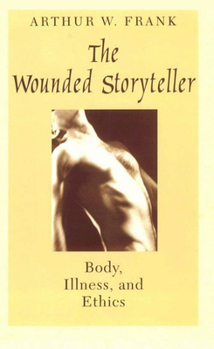The Wounded Storyteller: Body, Illness, and Ethics
Select Format
Select Condition 
Book Overview
In At the Will of the Body, Arthur Frank told the story of his own illnesses, heart attack and cancer. That book ended by describing the existence of a "remission society," whose members all live with some form of illness or disability. The Wounded Storyteller is their collective portrait. Ill people are more than victims of disease or patients of medicine; they are wounded storytellers. People tell stories to make sense of their...
Format:Paperback
Language:English
ISBN:0226259935
ISBN13:9780226259932
Release Date:May 1997
Publisher:University of Chicago Press
Length:231 Pages
Weight:0.70 lbs.
Dimensions:1.3" x 5.5" x 8.5"
Customer Reviews
5 ratings
Find Your Story
Published by Thriftbooks.com User , 15 years ago
Frank's book is a classic work on the stories that organize our lives. While he uses illness narratives as his case in point, the application of his work is much broader, from looking at how we have, consciously or unconsciously, set our lives up to work all the way out to looking at cosmology and spirituality.
On becoming the brother of all who suffer
Published by Thriftbooks.com User , 15 years ago
This is an extremely moving book on what it means to have a serious illness, such as cancer, and on why our coming to grips with this requires telling our story to others. When we are struck by an illness like cancer, our sense of having a meaningful past, present, and future is often severely damaged. Before cancer, if someone had asked us to tell our life story, we would have told it with a certain belief that the past led rationally to where we are, and that our future will be a reasonable result of the same journey that we have been on since we were born. But with cancer, it's very difficult to make sense of the reasonableness of something that has just happened, in spite of the life we've led that was supposed to lead to a different present, and one that we thought would lead to our future dreams. Now, all of that is shattered, and the rest of our future will be uncertain. In order to mend ourselves, we need to embark on a journey in which we tell our stories. Not once, but over and over. There are many versions of our stories. When we are giving medical history to a doctor or nurse, it's one kind of story, essentially focusing on the medical facts. When we tell a friend or loved one, personal details may be added. Over time, some pieces of the past become minimized in our stories, and other concerns need to be expanded upon. As we tell and retell our story, we resuture our broken selves, reintegrate our past selves with this new wounded present self, and make possible a new future self with new dreams. We become emotionally healthy, in spite of the physical ordeals we may still need to endure. We need to tell our stories for our sake, and we need to share them with others, for their sake. In addition to telling our own story, we need to listen to the stories of others, so that we can gain in perspective and wisdom. We are enriched by hearing about the paths that others have trod in coping with cancer. And in the process, for those who are ill, as well as for those who listen, life can once more be enchanting. One of the most poignant quotes in the book is by Albert Schweitzer: "Whoever among us has learned through personal experience what pain and anxiety really are must help to ensure that those out there who are in physical need obtain the same help that once came to him. He no longer belongs to himself alone; he has become the brother of all who suffer." He has joined the "brotherhood of those who bear the mark of pain."
Listening to the suffering
Published by Thriftbooks.com User , 16 years ago
Don't we all feel uncomfortable when trying to sustain a supportive relationship with someone suffering with a long-term illness? This book gives a philosophical framework for the mindset of someone in that situation. Initially it was rather heavy into social theory, but once you've worked through that part, you get some great food for thought. I've recommended it to folks in pastoral care and psychology.
a great resource
Published by Thriftbooks.com User , 16 years ago
The wounded storyteller gets to the heart of expressing one's voice in a case of illness.
Life Is A Group Grope
Published by Thriftbooks.com User , 24 years ago
Frank's novel does a masterful job in identifying the "voice" we all need in the battle with life threatnening illness. Embracing and affirming the "whole person" through their storytelling goes far in overcoming the modernist approach in treating the illness without the person. Recognizing the struggle as an opportunity for journey also sounds the call to help others currently in the trenches to bring about healing. This is a beautiful book.





